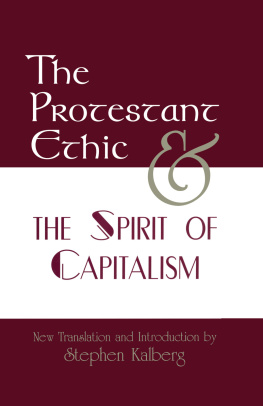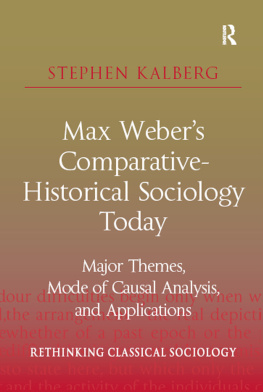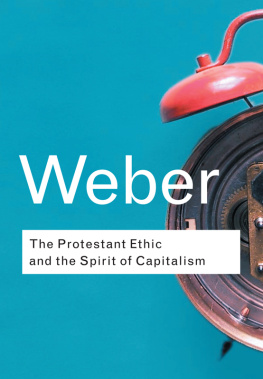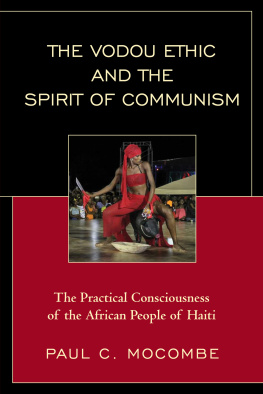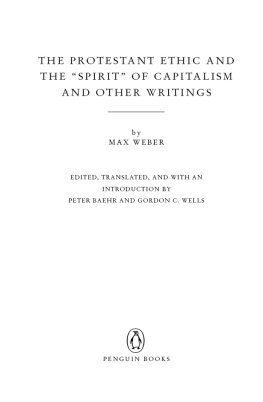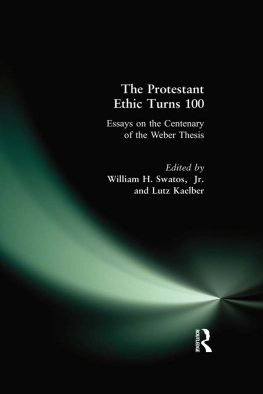
MAX WEBER
The Protestant Ethic and the Spirit of Capitalism
New Introduction and Translation by Stephen Kalberg
Boston University
Includes Webers Essays
The Protestant Sects and the Spirit of Capitalism
and
Prefatory Remarks to Collected Essays in the Sociology of Religion

Copyright 2001 by ROXBURY PUBLISHING COMPANY
All rights are reserved including the right of reproduction in whole or in part in any form.
First published in the USA and UK in 2001 by Fitzroy Dearborn Publishers
This edition published 2012 by Routledge
Routledge
Taylor & Francis Group
711 Third Avenue
New York, NY 10017
Routledge
Taylor & Francis Group
2 Park Square, Milton Park
Abingdon, Oxon OX14 4RN
British Library and Library of Congress Cataloguing in Publication data is available.
ISBN 1-57958-338-5
CONTENTS
Advance Praise for
The Protestant Ethic and the Spirit of Capitalism
Stephen Kalberg has produced a book that teachers and students will find invaluable. What an excellent idea, to combine a new translation of Max Webers The Protestant Ethic and the Spirit of Capitalism with other closely related writings of Webers, including a detailed and accessible introduction and supporting background information on Weber the man, on the book, and on its place in contemporary social science. Kalbergs comprehensive introduction manages to be informative and scholarly while remaining a clear and intelligible guide to the book. The introduction offers an accurate and refined statement of Webers important and influential (if often misunderstood) thesis, placing it in the context of its era and to Webers general idea of sociology. This new version of The Protestant Ethic should greatly improve upon its predecessor and clear up misunderstandings of Webers meaning which the earlier translation may have engendered.
Wes Sharrock, University of Manchester
This new translation of Webers The Protestant Ethic, one of the most important social science works of the twentieth century, is a welcome and worthwhile enterprise. It carefully presents the numerous and important nuances of Webers text, giving a clear idea of the place of this text in the intellectual framework of his time. Professor Kalbergs introduction provides a very interesting commentary on this text as well as the place of Webers work in the history of sociology and its relevance to the central problems of contemporary sociology theory. [The book] is a distinct contributionand a tool for students of sociological theory and its history.
S. N. Eisenstadt, The Hebrew University of Jerusalem
About the Translator
Stephen Kalberg is the author of Max Webers Comparative-Historical Sociology (1994), Max Webers Sociology of Civilizations (forthcoming), and numerous articles on Weber. He is the editor of Max Weber: The Confrontation with Modernity (2002). He teaches at Boston University, where he is Associate Professor of Sociology. He is also co-chair of the German Study Group at Harvard Universitys Center for European Studies.
Stephen Kalberg
T he only heretofore existing translation into English of Max Webers renowned study, The Protestant Ethic and the Spirit of Capitalism (PE), is now over seventy years old. Ideally, classic works should be retranslated every generation. As translations age, they become less accessible to younger audiences. Languages changed especially rapidly in the twentieth century and many terms and expressions quickly acquired a hollow ring. Moreover, whereas the 1930 translation of PE was oriented mainly to scholars and students steeped in a liberal arts canon, todays readership is more general and less acquainted with the great works of the past. This new translation is long overdue.
It has been guided by two goals. First, I have sought to render Webers text more accessible to the many audiences it has now acquired: scholars, students, undergraduate instructors, and not least, the general reader. Second, I have attempted to retain the integrity of Webers study by offering a close-to-the-text translation. The full substance of his thought must be conveyed and his nuanced, complex reasoning must be captured accurately. Indeed, I have sought to provide a translation that offers the reliability of meaning and precision of intention, especially in respect to Webers fine-grained causal lines of argument, indispensable to scholars of his works. In sum, I have placed a premium upon both readability and accuracy. For many texts, fulfillment of both of these goals would not present a large challenge to a translator. Unfortunately, in this respect, PE deviates from the norm and strays far afield from the user-friendly ideal.
Published in two parts in a social science journal in 190405,
Webers study not only lapses occasionally into abbreviated formulations and fails to provide identifying cues to obscure persons and places, it also confronts the reader frequently with sentences one-half page in length and paragraphs two or three pages long. Multiple clauses reside within each sentence, as Weber continuously struggles to lay out his theme in all its complexity. Yet even when he succeeds in doing so in a nuanced fashion, he frequently calls attention to qualifications and emphasizes the milieu-specific contingency of his statements.
Any attempt by a translator to render Webers text in a way that exactly captures his own manner of writing will stand opposed to the first goal mentioned above: readability and accessibility. This aim has required conformity to a practice frequently followed in German-English translations, namely, the radical shortening of sentences and paragraphs. In addition, in order to designate more clearly major and minor emphases, I have occasionally inserted parentheses into long sentences that proved impossible to shorten.
However, it soon became apparent that my goal of readability and accessibility would not be adequately achieved through these measures alone. Hence, several propaedeutic aids became indispensable:
Persons, places, groups, and documents have been identified in short bracketed phrases inserted into the text.
Some persons, places, groups, and documents have been further identified in new endnotes; [sk] follows these endnotes.
Occasional endnotes that clarify Webers argument have been added; [sk] follows these endnotes.
Short supplementary phrases have occasionally been added into the text, in brackets, on those occasions where Webers shorthand formulations require clarification.
Translations, in brackets, of foreign language passages have been added. All passages in brackets in the text and endnotes are mine.
Terms that are key to Webers argument, as well as several historical terms, have been defined in a glossary; their first usage in each chapter has been set in bold type.
With only a few exceptions as required by context, the translation of all key terms has been standardized throughout the book. In this manner, Webers forceful call for terminological precision in the social sciences has been respected and the major threads of his argument can more easily be followed.
Innumerable partial bibliographical entries have been adjusted and completed.
In two important ways Weber did assist his audience. First, through regular italicization. Although italicization at the level he practiced is generally not permitted today in English publications, Webers frequent italicization is retained. He regularly orients and guides his reader to concepts, themes, and distinctions central to his argument through this mode of emphasis. Second, Weber inserts nuance through regular use of inverted commas (national character). This practice has also been retained, as it indicates his unwillingness to accept fully a number of commonly used concepts and his awareness of their problematic and controversial character.
Next page
